Datasheet
Year, pagecount:2014, 4 page(s)
Language:English
Downloads:3
Uploaded:August 09, 2018
Size:761 KB
Institution:
-
Comments:
Attachment:-
Download in PDF:Please log in!
Comments
No comments yet. You can be the first!Most popular documents in this category
Content extract
Source: http://www.doksinet The Middle Path of Moderation in Islam: The Quranic Principle of Al-Al-Wasatiyya By Mohammed Hashim Kamali Reviewed by Tariq Ramadan, CILE Director Professor Mohammad Hashim Kamali is providing us here with an essential and timely exploration of the concept known in contemporary Islamic tradition of moderation (al-wasaṭiyya). Kamali adopts a perspective which is different to that of other studies within this subject area and thus is a welcome addition. The importance of Kamali’s -40year contribution to the field of Islamic Studies, in particular within the discipline of Islamic Law and Jurisprudence, is already widely recognised. Indeed many of his books have become significant references for those using the English language, providing much needed support towards the in-depth and comprehensive study of Islamic law and jurisprudence, ethics and certain essential notions such as freedom, penal code and interfaith dialogue. Kamali’s Principles of
Islamic Jurisprudence and Freedom of Expression in Islam are two such noteworthy resources. This new book is another valuable contribution of critical importance. In this study, Kamali focuses upon a central notion of Islam, namely moderation and the way in which this concept can, and indeed, needs to be understood from within the Islamic reference. The book is divided into two parts. The first part is a conceptual analysis with Kamali undertaking to define the concept of al-wasaṭiyya and then, in consideration of the scriptural sources, seeking to illustrate where we can find the concept of moderation in our daily lives; how moderation is defined and the way in which the centrality of the Islamic message relies upon the correct interpretation and practice of moderation. Believers will be familiar with the well-known verse of the Quran: “Thus we have made of you a community justly balanced” () َوكَ َذلِـ َـك َج َعلْ َناكُ ـ ْم أُ َّم ـ ًة َو
َس ـطًا. In his book, Kamali enables the readers to clarify their understanding of moderation within Islam through highlighting and reflecting upon other Qur’anic verses and prophetic traditions (aḥādīth), each of which addresses the concept of moderation. In the first part of his study, Kamali argues that everything within the Islamic tradition is based upon the concept of moderation. Moreover, Kamali connects his process of thought through the study of, for example, the work of Saʿd al-Dīn al-Taftazānī, using different key notions such as wisdom (al-ḥikmah), purity (al-‘iffah), and courage (al-shajāʿah). 63-E Source: http://www.doksinet Kamali pays close attention to the notion of justice (al-ʿadl) which includes the crucial, yet sometimes overlooked or misunderstood, dimension of striving to seek the middle path in everything. Kamali examines the opinions of scholars within the Muslim tradition (both notable early and contemporary scholars) concerning
moderation. He uses the scriptural sources as well as the scholarly legacy (turāth), the reference that originates from the understanding that the scholars had or still have, by using both the text and the context. Kamali relies on the School of Law as much as the School of Maqasid (the higher objectives of Islam) to illustrate that in relation to rules, not only is everything in Islam based on moderation but that the very understanding of the higher objectives of Islam relies on moderation too. So the entire message of shariah is in fact an approach whose essence is that of moderation. As part of his conceptual analysis, Kamali observes that the meaning of moderation includes the urgent understanding that everything in Islam is very much based on the rejection of extremism and extremist interpretations in one way or another. Kamali brings to our attention a key area, which he refers to as “manifestations of al-wasaṭiyya”. Through his explanation of these manifestations, Kamali
demonstrates that everything within these manifestations is related to the centrality of divine oneness (al-Tawḥīd). This is a fundamental point since the understanding of the way Muslims consider the very notion of Tawḥīd is based on this understanding of al-wasaṭiyya as well as the importance of taking into consideration the diversity of the various schools of thought. Kamali still goes further by proposing the need to include in our understanding a balance between that which is changeable (mutaghayyirāt) and that which is immutable (thawābit). Kamali also demonstrates the importance of moderation related to the notion of graduality (tadarruj). To me, this is insightful Hence he concludes that not only is the message of Islam based on moderation, but so too is the methodology that we derive from our scriptural sources. Kamali proposes that this is evident in, for example, the requirement for Muslims to promote benefits (maṣāliḥ) and avoid harm (mafāsid) - in practical
terms, we need to consider both the balance and the strategy in implementing (taḥqīq al manāṭ). Kamali explores and presents this concept in an interesting way furthering our understanding; what he refers to as “the identification of al-wasaṭiyya”. This is a critical contribution to the way we can understand our relationship with oneself and within our community; our relationship within interfaith dialogue; and our relationship to ‘the other’. This in turn helps us in our understanding of the different schools of thought; the relation to rationality (al-‘aql). 64-E Source: http://www.doksinet It helps us in our understanding of the texts (al-nuṣūṣ); and in the understanding even of the consensus (al-ijmāʿ). These notions within the Islamic tradition are in fact the foundations, not only of the basic and fundamental message of Islam, but also of the methodology from which the central message of Islam is derived and its subsequent implementation. In reading
Kamali’s analyses and his clear explanations within this first part, I think that readers will gain a better understanding of the way in which we might consider and best apply the guidance from our scriptural sources. Moderation is the heart, moderation is the way Whilst the first part of Kamali’s book is very much the backdrop from which a believer may draw from the central message of Islam; the second part of the book moves away from the overall message of Islam to focus on specific fields where moderation exists and is needed. Kamali invites believers to reassess and re-evaluate their perspective on moderation. For example he refers to justice and as the true meaning of the word itself shows, justice is wholly based on balancing. Kamali explores the way that within the Islamic tradition we have a concept relating to both moderation and justice. Similarly, in relation to religiosity, he considers how we need to understand that we ought not be completely obsessed with the
hereafter and that instead we ought to be aiming to achieve a balance between focusing on our life in this world and preparing ourselves for life beyond death as it is said in the Quran: “So seek the abode of the Hereafter through what God has given you and do not forget your part in this world”: وابتغ فيام آتاك الله الدار اآلخرة وال تنس نصيبك من الدنيا Kamali refers to the need for moderation as we consider diversity from within (ikhtilāf), a kind of reasoned disagreement and the need to acknowledge that we might be right and ‘the other’ might be wrong, but that the other way could be possible too as al Imām al-Shāfiʿī stated. So here again Kamali brings to the fore the realisation that these divergences are also promoting moderation. Kamali makes the vital observation of moderation between spirituality and legalism and how, for example, the Sufi tradition helped to reconnect law and ethics; spirituality and legal
framework. Once again there are many different examples relating to promoting the good and removing hardship - the relationship with our environment and the way in which we have an obligation to protect it; the relationship with ethical behaviour and related issues within the financial sector and economies; the very notion of jihād which is so much misunderstood is also considered; our lifestyle, how we consume and our obligation to avoid consumerism; and as another example, how there is a need to address globalisation and the reality between respecting tradition and living in, contributing to the modern world. Kamali also explores the 65-E Source: http://www.doksinet important issue of women and women’s rights in Islam; how there is a critical need to promote moderation and to understand the status of women; and how the situation in our societies relating to women requires reform. So this second part is a very interesting approach of implementing the concepts explained in the
first part and proposing a new understanding. Once again, according to Kamali, embedded within these numerous issues, moderation is both a requirement and a means. This is a vital and much-needed text enabling the reader to better understand the deep message of Islam based on the scriptural sources. Through studying the contributions from all the key scholars, Kamali takes the reader right up to the reality of our time where once again he provides a thought-provoking perception of the contemporary challenges. An important book to read; an important book to study; a critical book to promote in relation to the understanding of Islam, the reader is made subtly aware of the need for each of us to ‘get it right’. The diversity of thoughts within Muslim communities in the West or in Muslim-majority countries can in fact be viewed as a positive contribution, helping us to understand that no one particular person among us ought to claim that s/he has the absolute, finite answer. Through
his book, Kamali encourages the reader to understand that diversity and interpretation is simply a way to implement the very meaning, the essence of that verse from the Quran “Thus we have made of you a community justly balanced”, a community of the Middle Path. This is exactly the kind of discourse that our communities need today. 66-E
Islamic Jurisprudence and Freedom of Expression in Islam are two such noteworthy resources. This new book is another valuable contribution of critical importance. In this study, Kamali focuses upon a central notion of Islam, namely moderation and the way in which this concept can, and indeed, needs to be understood from within the Islamic reference. The book is divided into two parts. The first part is a conceptual analysis with Kamali undertaking to define the concept of al-wasaṭiyya and then, in consideration of the scriptural sources, seeking to illustrate where we can find the concept of moderation in our daily lives; how moderation is defined and the way in which the centrality of the Islamic message relies upon the correct interpretation and practice of moderation. Believers will be familiar with the well-known verse of the Quran: “Thus we have made of you a community justly balanced” () َوكَ َذلِـ َـك َج َعلْ َناكُ ـ ْم أُ َّم ـ ًة َو
َس ـطًا. In his book, Kamali enables the readers to clarify their understanding of moderation within Islam through highlighting and reflecting upon other Qur’anic verses and prophetic traditions (aḥādīth), each of which addresses the concept of moderation. In the first part of his study, Kamali argues that everything within the Islamic tradition is based upon the concept of moderation. Moreover, Kamali connects his process of thought through the study of, for example, the work of Saʿd al-Dīn al-Taftazānī, using different key notions such as wisdom (al-ḥikmah), purity (al-‘iffah), and courage (al-shajāʿah). 63-E Source: http://www.doksinet Kamali pays close attention to the notion of justice (al-ʿadl) which includes the crucial, yet sometimes overlooked or misunderstood, dimension of striving to seek the middle path in everything. Kamali examines the opinions of scholars within the Muslim tradition (both notable early and contemporary scholars) concerning
moderation. He uses the scriptural sources as well as the scholarly legacy (turāth), the reference that originates from the understanding that the scholars had or still have, by using both the text and the context. Kamali relies on the School of Law as much as the School of Maqasid (the higher objectives of Islam) to illustrate that in relation to rules, not only is everything in Islam based on moderation but that the very understanding of the higher objectives of Islam relies on moderation too. So the entire message of shariah is in fact an approach whose essence is that of moderation. As part of his conceptual analysis, Kamali observes that the meaning of moderation includes the urgent understanding that everything in Islam is very much based on the rejection of extremism and extremist interpretations in one way or another. Kamali brings to our attention a key area, which he refers to as “manifestations of al-wasaṭiyya”. Through his explanation of these manifestations, Kamali
demonstrates that everything within these manifestations is related to the centrality of divine oneness (al-Tawḥīd). This is a fundamental point since the understanding of the way Muslims consider the very notion of Tawḥīd is based on this understanding of al-wasaṭiyya as well as the importance of taking into consideration the diversity of the various schools of thought. Kamali still goes further by proposing the need to include in our understanding a balance between that which is changeable (mutaghayyirāt) and that which is immutable (thawābit). Kamali also demonstrates the importance of moderation related to the notion of graduality (tadarruj). To me, this is insightful Hence he concludes that not only is the message of Islam based on moderation, but so too is the methodology that we derive from our scriptural sources. Kamali proposes that this is evident in, for example, the requirement for Muslims to promote benefits (maṣāliḥ) and avoid harm (mafāsid) - in practical
terms, we need to consider both the balance and the strategy in implementing (taḥqīq al manāṭ). Kamali explores and presents this concept in an interesting way furthering our understanding; what he refers to as “the identification of al-wasaṭiyya”. This is a critical contribution to the way we can understand our relationship with oneself and within our community; our relationship within interfaith dialogue; and our relationship to ‘the other’. This in turn helps us in our understanding of the different schools of thought; the relation to rationality (al-‘aql). 64-E Source: http://www.doksinet It helps us in our understanding of the texts (al-nuṣūṣ); and in the understanding even of the consensus (al-ijmāʿ). These notions within the Islamic tradition are in fact the foundations, not only of the basic and fundamental message of Islam, but also of the methodology from which the central message of Islam is derived and its subsequent implementation. In reading
Kamali’s analyses and his clear explanations within this first part, I think that readers will gain a better understanding of the way in which we might consider and best apply the guidance from our scriptural sources. Moderation is the heart, moderation is the way Whilst the first part of Kamali’s book is very much the backdrop from which a believer may draw from the central message of Islam; the second part of the book moves away from the overall message of Islam to focus on specific fields where moderation exists and is needed. Kamali invites believers to reassess and re-evaluate their perspective on moderation. For example he refers to justice and as the true meaning of the word itself shows, justice is wholly based on balancing. Kamali explores the way that within the Islamic tradition we have a concept relating to both moderation and justice. Similarly, in relation to religiosity, he considers how we need to understand that we ought not be completely obsessed with the
hereafter and that instead we ought to be aiming to achieve a balance between focusing on our life in this world and preparing ourselves for life beyond death as it is said in the Quran: “So seek the abode of the Hereafter through what God has given you and do not forget your part in this world”: وابتغ فيام آتاك الله الدار اآلخرة وال تنس نصيبك من الدنيا Kamali refers to the need for moderation as we consider diversity from within (ikhtilāf), a kind of reasoned disagreement and the need to acknowledge that we might be right and ‘the other’ might be wrong, but that the other way could be possible too as al Imām al-Shāfiʿī stated. So here again Kamali brings to the fore the realisation that these divergences are also promoting moderation. Kamali makes the vital observation of moderation between spirituality and legalism and how, for example, the Sufi tradition helped to reconnect law and ethics; spirituality and legal
framework. Once again there are many different examples relating to promoting the good and removing hardship - the relationship with our environment and the way in which we have an obligation to protect it; the relationship with ethical behaviour and related issues within the financial sector and economies; the very notion of jihād which is so much misunderstood is also considered; our lifestyle, how we consume and our obligation to avoid consumerism; and as another example, how there is a need to address globalisation and the reality between respecting tradition and living in, contributing to the modern world. Kamali also explores the 65-E Source: http://www.doksinet important issue of women and women’s rights in Islam; how there is a critical need to promote moderation and to understand the status of women; and how the situation in our societies relating to women requires reform. So this second part is a very interesting approach of implementing the concepts explained in the
first part and proposing a new understanding. Once again, according to Kamali, embedded within these numerous issues, moderation is both a requirement and a means. This is a vital and much-needed text enabling the reader to better understand the deep message of Islam based on the scriptural sources. Through studying the contributions from all the key scholars, Kamali takes the reader right up to the reality of our time where once again he provides a thought-provoking perception of the contemporary challenges. An important book to read; an important book to study; a critical book to promote in relation to the understanding of Islam, the reader is made subtly aware of the need for each of us to ‘get it right’. The diversity of thoughts within Muslim communities in the West or in Muslim-majority countries can in fact be viewed as a positive contribution, helping us to understand that no one particular person among us ought to claim that s/he has the absolute, finite answer. Through
his book, Kamali encourages the reader to understand that diversity and interpretation is simply a way to implement the very meaning, the essence of that verse from the Quran “Thus we have made of you a community justly balanced”, a community of the Middle Path. This is exactly the kind of discourse that our communities need today. 66-E
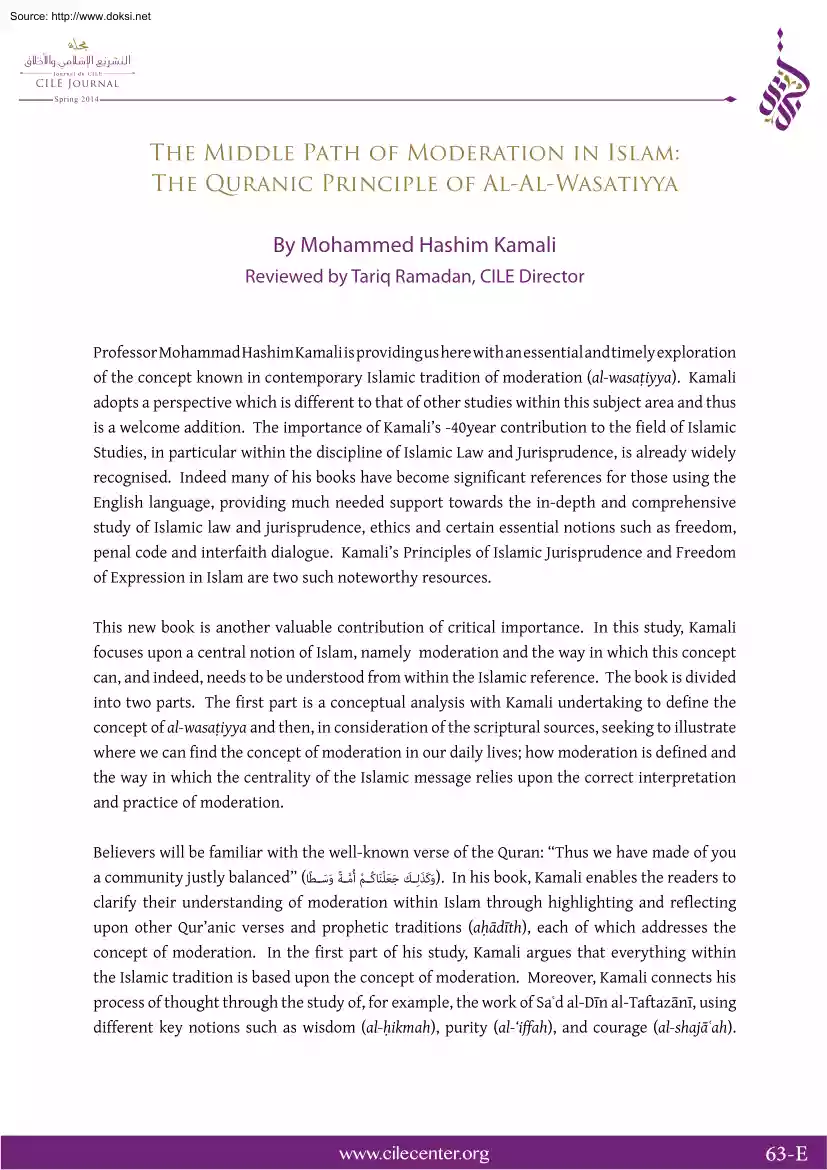
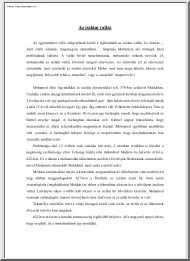
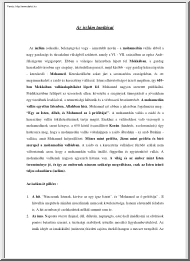
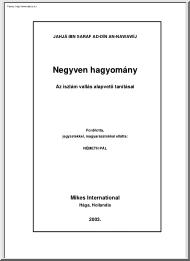
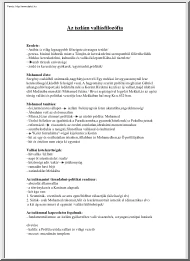
 Just like you draw up a plan when you’re going to war, building a house, or even going on vacation, you need to draw up a plan for your business. This tutorial will help you to clearly see where you are and make it possible to understand where you’re going.
Just like you draw up a plan when you’re going to war, building a house, or even going on vacation, you need to draw up a plan for your business. This tutorial will help you to clearly see where you are and make it possible to understand where you’re going.